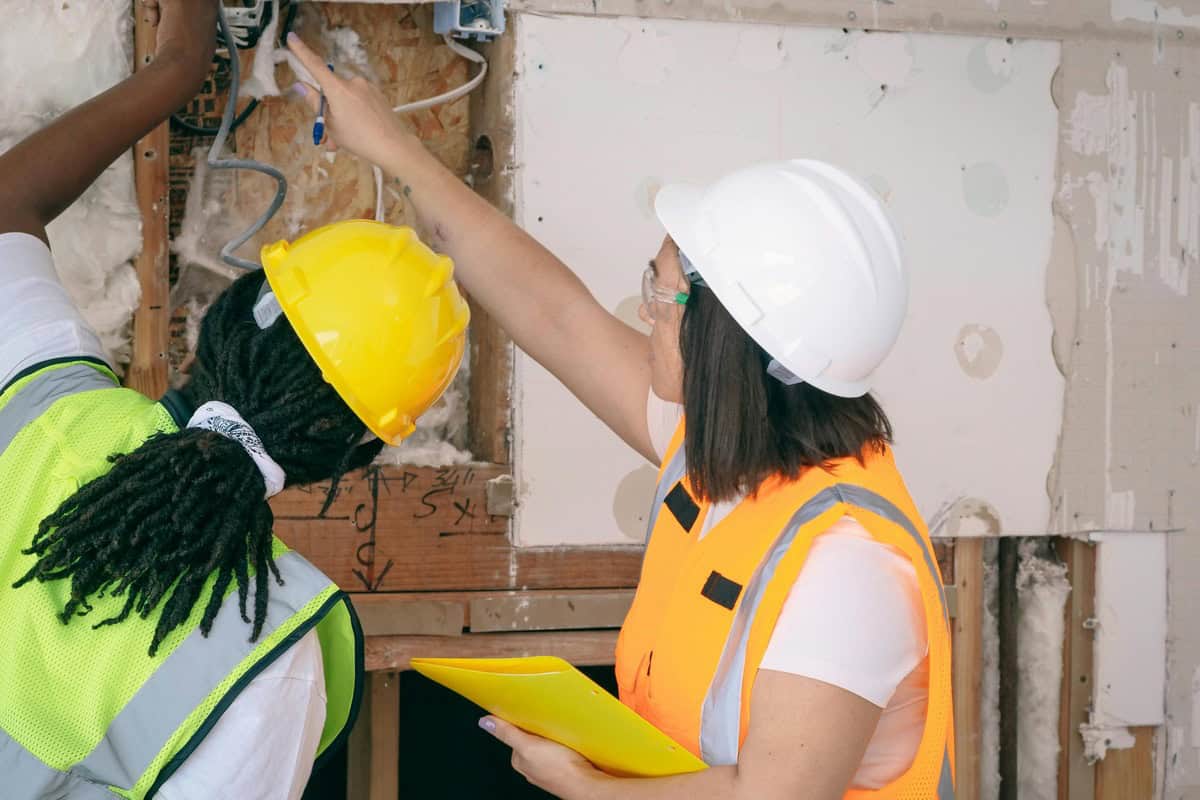
How to Become an Electrician?
Thinking about a hands-on, rewarding career with solid job prospects? If so, understanding how to become an electrician is the first step toward a trade that combines technical skills, problem-solving, and steady demand across various industries. In this guide, we’ll walk you through the steps, skills, and qualifications needed to build a successful career as an electrician, as well as the exciting opportunities that await in this field.
Key Takeaways
- An electrician installs, maintains, and repairs electrical systems in homes, businesses, and industrial settings.
- To become an electrician, you can start by enrolling in an apprenticeship program, where you’ll receive both classroom education and hands-on experience.
- Essential skills for electricians include technical knowledge, problem-solving abilities, attention to detail, and strong safety awareness.
What Does an Electrician Do?
Electricians are responsible for installing, maintaining, and repairing electrical systems that power everything from lights to large machinery. Their work ensures that buildings are safe, efficient, and meet all electrical codes and standards. Electricians often specialize in different areas, such as:
- Residential Electricians: Focus on wiring and maintaining electrical systems in homes and small apartment buildings.
- Commercial Electricians: Work on larger-scale projects, including office buildings, retail stores, and restaurants.
- Industrial Electricians: Specialize in electrical systems for factories and manufacturing plants, handling complex machinery and power distribution.
How to Become an Electrician?
Becoming an electrician in the U.S. requires a mix of education, hands-on training, and, in most cases, licensing. To start, you’ll need at least a high school diploma or GED, followed by enrollment in a training program or apprenticeship where you’ll gain essential knowledge and real-world experience.
Electricians also have to pass exams to meet safety standards and may need state or local licenses depending on where they work.
Related: How to Become a Chef? 5 Signs You’re Meant to be One
How to Become an Electrician in New York?
In New York, becoming an electrician involves several key steps, including specific training and licensing requirements.
You’ll typically need to complete an apprenticeship program approved by New York’s Department of Buildings (DOB), which combines classroom instruction with on-the-job training.
In New York City, electricians are required to obtain a special license issued by the DOB. There are two primary types of licenses:
- Master Electrician License: Required to secure a construction permit for electrical work, allowing electricians to perform electrical installations independently.
- Special Electrician License: Also permits the holder to obtain a construction permit, but it is designed for those working under the employment of a building owner or company.
How to Become a Licensed Electrician?
To become a licensed electrician, you’ll need to complete specific training and pass a licensing exam. The process generally involves:
- Education: Begin with a high school diploma or GED, then enroll in a technical school or apprenticeship program. While some apprenticeship programs may accept applicants without a high school diploma or GED, those under 18 (ages 16–17) typically need parental consent to participate.
- Apprenticeship: Complete an apprenticeship, where you’ll gain hands-on experience under the supervision of a licensed electrician.
- Licensing Exam: After your apprenticeship, you must pass a licensing exam.
Skills and Qualities Needed to Become an Electrician
Here are some of the most important skills and attributes that are important to become an electrician:
- Technical Knowledge: Electricians must have a solid understanding of electrical systems, circuits, wiring, and equipment.
- Problem-Solving Skills: Electricians often face unexpected challenges on the job, from diagnosing faulty systems to figuring out complex installations
- Attention to Detail: Precision is crucial in electrical work, where small errors can lead to significant safety risks or system failures.
- Physical Stamina and Dexterity: The job can be physically demanding, requiring electricians to work in confined spaces, lift heavy equipment, and perform tasks that require fine motor skills.
Personal Qualities
Beyond technical skills, successful electricians possess certain personal qualities that help them thrive in the field.
- Safety Awareness: Electricians work with high-voltage systems, which means that safety is always a top priority.
- Reliability and Dependability: Clients and employers rely on electricians to complete projects on time and to a high standard.
- Adaptability: Electrical systems and technology are constantly evolving, and electricians must be able to learn and adapt to new methods, tools, and codes as the industry changes.
Steps to Becoming an Electrician
We have elaborated a step-by-step guide to help you on the path to becoming a skilled, licensed electrician:
Step 1: Complete Basic Education Requirements
Begin your path to becoming an electrician with a high school diploma or GED, as this education provides essential math and science skills crucial to understanding electrical concepts. After that, you can enroll in a technical school or directly pursue an apprenticeship program.
Some apprenticeships may accept applicants who do not have a high school diploma or GED, though individuals aged 16 or 17 generally need parental consent to join.
Step 2: Enroll in an Electrician Training Program
Next, enroll in a formal training program to learn the fundamentals of electrical systems, tools, and safety procedures. Options include trade schools, technical institutes, and community college programs, many of which offer coursework in circuitry, blueprint reading, and electrical theory.
Step 3: Gain Hands-On Experience Through an Apprenticeship
Most electricians complete an apprenticeship to gain real-world experience. During an apprenticeship, you’ll work under the supervision of a licensed electrician, learning how to install, repair, and maintain electrical systems in a variety of settings.
Apprenticeships typically last from 1 to 6 years and include both on-the-job training and classroom instruction.
Step 4: Get Licensed and Certified
After completing your apprenticeship, it’s time to get licensed. Licensing requirements vary by region but generally include passing a comprehensive exam on electrical codes, safety regulations, and industry best practices.
Many electricians also pursue additional certifications, which can improve job prospects and allow for specialization in areas like renewable energy or industrial electrical work.
Step 5: Advance Your Career as an Electrician
With a license in hand, there are many opportunities for career growth. You may pursue additional certifications to specialize in fields like solar energy, high-voltage systems, or electrical inspection. With experience, electricians can advance to roles like Master Electrician, supervisor, or even start their own business, providing services to residential or commercial clients.
How Long Does It Take to Become an Electrician?
Becoming an electrician typically requires about 4 to 5 years of training, though this timeline can vary based on the type of program and state requirements. Many start with a technical school or community college program, which can take between 6 months and 2 years to complete.
Following this, the majority of aspiring electricians enter an apprenticeship, which usually lasts from 1 to 6 years, depending on the trade, nd includes paid, hands-on experience along with classroom instruction.
How Much Do Electricians Earn?
In New York, electricians earn an average salary of around $55,000 to $70,000 per year, though this can vary widely based on experience, specialization, and work setting.
Several factors can influence an electrician’s salary. Specializations, such as working with high-voltage systems, renewable energy installations, or industrial electrical work, often command higher wages due to the advanced skills required. Benefits of Becoming an Electrician
Job security, good pay, varied work environments, and growth potential.
Related: 25 an Hour is How Much a Year? Calculate Your Annual Earnings
Challenges in the Electrical Field
A career as an electrician offers many rewards, but it also comes with challenges:
- Physical Demands: Electricians often work in tight spaces, lift heavy equipment, and spend long hours on their feet, requiring good physical health and stamina.
- Safety Risks: Working with electrical systems involves risks like shocks, burns, and falls. Strict adherence to safety protocols is essential to prevent accidents.
- Continuous Learning: The field evolves with new technologies and code updates, so electricians must stay current with ongoing education and training.
- Irregular Hours: Many electricians work non-traditional hours, including evenings and weekends, and may face tough weather conditions on outdoor jobs.
- Problem-Solving Under Pressure: Electricians frequently encounter unexpected issues, making strong problem-solving skills under pressure essential.
Frequently Asked Questions About How To Become an Electrician
We have gathered some frequently asked questions about how to become an electrician. Let’s jump right into it!
Do I need a college degree to become an electrician?
Depending on the state where you live. In New York for example, a college degree is not required to become an electrician.
How physically demanding is the job of an electrician?
The job can be physically demanding, involving lifting heavy equipment, working in confined spaces, and performing tasks that require stamina and dexterity.
Is Being an Electrician Hard?
Becoming and working as an electrician can be challenging. The path requires dedication to learning technical skills, hands-on training, and an understanding of complex electrical systems. Physically, electricians face demanding tasks like lifting heavy equipment, working in confined spaces, and occasionally dealing with challenging weather conditions. Safety risks are also part of the job, so electricians must be vigilant and detail-oriented to prevent accidents.
However, for those who enjoy problem-solving, working with their hands, and tackling new challenges, the work can be highly fulfilling.
Can I become an electrician if I have no experience?
Yes. You can become an electrician without prior experience by enrolling in an apprenticeship program, which provides the necessary hands-on training and education.
What are the licensing requirements to become an electrician?
Licensing requirements vary by state but generally include completing an apprenticeship, gaining a certain amount of work experience, and passing a licensing exam that covers electrical codes and safety standards.
Are there online courses to become an electrician?
While some theoretical aspects of electrician training can be completed online, hands-on training through an apprenticeship or in-person program is essential for gaining practical skills.
Is There a Demand for Electricians?
Yes, there is a strong demand for electricians!
With ongoing construction projects, maintenance needs, and advancements in technology, electricians are essential, ensuring steady job opportunities and a promising career path.
If you’re ready to start your journey or looking for new opportunities as an electrician, check out the latest job listings on Job Today and apply directly to employers who are hiring now



